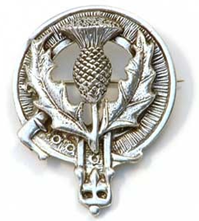|
The Campbells
Are Coming
is a Scottish song associated with Clan
Campbell. The tune, a traditional Scottish air,
is similar to "The Town of Inveraray" (Scottish
Gaelic:
"Baile Ionaraora")
where stands the Campbell clan castle.
Historically one of the largest and most
powerful of the Highland clans, their lands were
in Argyll and the chief of the clan became the
Earl and later Duke of Argyll.
In traditional
genealogies of the Clan Campbell, its origins
are placed amongst the ancient Britons of
Strathclyde.
However, the earliest Campbell in written
records is Gillespie who is recorded in 1263.
Early grants to Gillespie and his
relations were almost all in east-central
Scotland.
However, the family's connection with
Argyll came some generations before when a
Campbell married the heiress of the O'Duines and
she brought with her the Lordship of Loch Awe.
Because of this the early clan name was
Clan O'Duine and this was later
supplanted by the style Clan Diarmid.
This name came from a fancied connection
to Diarmid the Boar, a great hero from
early Celtic mythology.
Between 1200
and 1500 the Campbells emerged as one of the
most powerful families in Scotland, dominant in
Argyll and capable of wielding a wider influence
and authority from Edinburgh to the Hebrides and
western Highlands.
The origins of
the song are unclear. The song was definitely
extant by 1745 and perhaps much earlier. It may
have been inspired by the war of the Jacobite
rising of 1715 (John Campbell, 2nd Duke of
Argyll was the loyalist war leader and many
Scottish loyalists were Campbells); According to
Lewis Winstock the
tune accompanied the Scottish loyalist vanguard
in the Jacobite war,
and Robert Wodrow ascribes that name to
one of the bagpipe tunes that accompanied
Argyle's Highlanders entrance into Perth and
Dundee.
Or it may have
been concerned with earlier events around the
deposing of Mary Queen of Scots: "Lochleven"
presumably refers to Lochleven Castle where Mary
Queen of Scots was imprisoned in 1567, and
"Great Argyl" may refer to Archibald Campbell,
5th Earl of Argyll who attempted to rescue her.
The lyrics are
commonly attributed to Robert Burns, like many
Scottish songs which are actually traditional or
of unknown origin. Burns did write a version
with some different verses.
The Campbells
are comin, Oho, Oho!
The Campbells are comin, Oho, Oho!
The Campbells are comin to bonie Lochleven,
The Campbells are comin Oho, Oho!
Upon the
Lomonds I lay, I lay,
Upon the Lomonds I lay, I lay,
I looked down to bonie Lochleven,
And saw three bonie perches play.
Great Argyle he
goes before,
He maks his cannons and guns to roar,
Wi' sound o' trumpet, pipe and drum
The Campbells are comin Oho, Oho!
The Campbells
they are a' in arms
Their loyal faith and truth to show,
Wi' banners rattling in the wind
The Campbells are comin Oho, Oho!
The Campbells
are comin, Oho, Oho!
The Campbells are comin, Oho, Oho!
The Campbells are comin to bonie Lochleven,
The Campbells are comin Oho, Oho!
Some Military
Pipe Bands are forbidden to play "The Campbells
are Coming"; it may be because of the Glencoe
Massacre.
In 1692, 38
unarmed people of the Clan MacDonald of Glencoe
were killed in the Massacre of Glencoe when a
Government initiative to suppress Jacobitism was
entangled in the long running feud between Clan
MacDonald and Clan Campbell. The slaughter of
the MacDonalds at the hands of the soldiers, led
by Captain Robert Campbell of Glenlyon, after
enjoying their hospitality for over a week was a
major affront of Scots Law and Highland
tradition. The majority of soldiers were not
Campbells, but a roll call from a few months
before included six Campbells in addition to Cpt.
Robt. Campbell: Corporal Achibald Campbell,
Private Archibald Campbell (elder), Private
Donald Campbell (younger), Private Archibald
Campbell (younger), Private James Campbell,
Private Donald Campbell (elder), and Private
Duncan Campbell.
That feelings
still run high is attested by the fact that. In
the late 20th century the Clachaig Inn, a hotel
and pub in Glencoe popular with climbers, had a
sign on its door "No Hawkers or Campbells". |



